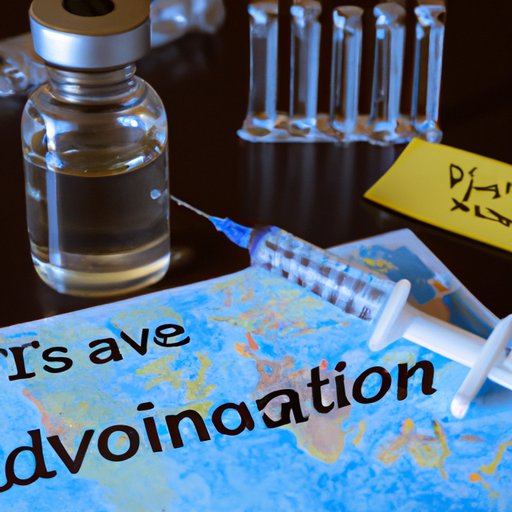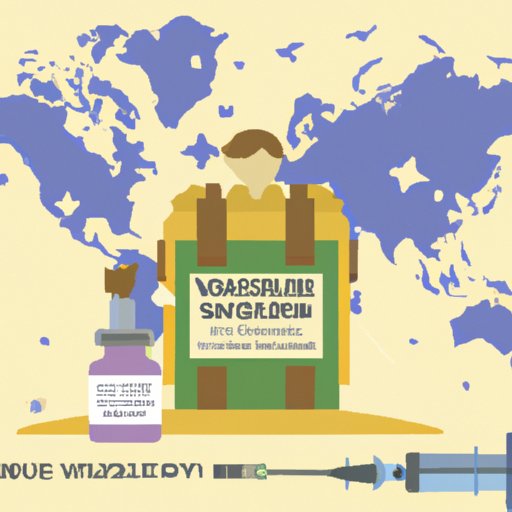Introduction
When it comes to planning a trip abroad, there is often one important question that arises: do you have to get vaccinated to travel? The answer to this question is not always simple, as it depends on a variety of factors including the destination country, age, and health status of the traveler. In this article, we will explore the pros and cons of vaccinations for travelers, the necessity of vaccinations for international travel, vaccine requirements for different countries, how vaccines can help keep you safe during your travels, and the risks of not getting vaccinated before traveling.
Pros and Cons of Vaccination for Travelers
Getting vaccinated before traveling is an important step in protecting your health and the health of those around you. Vaccines help to prevent the spread of many serious diseases, and are especially important for travelers who are visiting countries with higher levels of disease. However, there are some potential drawbacks to getting vaccinated before traveling, and it is important to consider both the advantages and disadvantages before making a decision.
Advantages of Getting Vaccinated Before Traveling
One of the main benefits of getting vaccinated before traveling is that it can help to protect you from contracting certain diseases while abroad. Vaccines are highly effective in preventing the spread of infectious diseases, and can help reduce the risk of serious illness or even death. Additionally, getting vaccinated before traveling can help to protect those at home by reducing the chances of bringing back any illnesses acquired abroad.
Disadvantages of Getting Vaccinated Before Traveling
Although there are many benefits to getting vaccinated before traveling, there are also some potential drawbacks. For some people, getting vaccinated may cause mild side effects such as soreness, redness, or swelling at the injection site. Additionally, some vaccines require multiple doses over a period of time, which may be difficult for those with limited time before their trip. Finally, some vaccines may be expensive, and may not be covered by insurance.

Exploring the Necessity of Vaccinations for International Travel
When traveling abroad, it is important to research the local laws and regulations regarding vaccinations. Depending on where you are traveling, certain vaccines may be required, recommended, or completely optional. It is essential to understand the specific requirements for the country you are visiting in order to ensure that you are following all necessary protocols.
Reasons to Get Vaccinated Before Traveling Abroad
In some cases, certain vaccines are required in order to enter certain countries. This is usually the case for countries with higher rates of certain infectious diseases, and these requirements are typically enforced at airports and other points of entry. Additionally, some countries may require proof of vaccination in order to obtain a visa. Finally, many countries recommend that travelers get vaccinated before entering, in order to reduce the risk of contracting certain diseases.
Exceptions to the Requirement of Vaccinations
In some cases, certain travelers may be exempt from the requirement of vaccinations. For example, children under a certain age may not need to get vaccinated before traveling, or individuals with certain medical conditions may be exempt as well. Additionally, some countries may allow travelers to enter without proof of vaccination if they are able to provide a medical certificate indicating that they are not at risk of transmitting any diseases.
Examining Vaccine Requirements for Different Countries
When planning a trip abroad, it is important to research the specific vaccine requirements for the destination country. Vaccine requirements can vary greatly from country to country, and it is essential to make sure that you are up-to-date on all necessary vaccines before traveling. Additionally, it is important to understand any exemptions that may apply to certain travelers.
Researching Required Vaccines for Your Destination Country
The best way to make sure that you are up-to-date on all necessary vaccines before traveling is to research the specific vaccine requirements for the destination country. Most countries will have information available online regarding their vaccination requirements, and it is important to make sure that you are aware of any changes that may have occurred since your last visit. Additionally, it is important to make sure that you are up-to-date on all recommended vaccines, in order to reduce the risk of contracting certain diseases.
Understanding Vaccine Exemptions for Certain Countries
In some cases, certain travelers may be exempt from the requirement of vaccinations. These exemptions can vary from country to country, but typically include children under a certain age, individuals with certain medical conditions, and individuals who can provide a medical certificate indicating that they are not at risk of transmitting any diseases. It is important to research the specific exemptions for the destination country in order to determine whether or not you are eligible for an exemption.

How Vaccines Can Help Keep You Safe During Your Travels
Getting vaccinated before traveling is an important step in protecting your health and the health of those around you. Vaccines are highly effective in preventing the spread of infectious diseases, and can help reduce the risk of serious illness or even death. Additionally, getting vaccinated before traveling can help to protect those at home by reducing the chances of bringing back any illnesses acquired abroad.
Benefits of Vaccination While Traveling
Getting vaccinated before traveling can help to protect you from contracting certain diseases while abroad. Vaccines are highly effective in preventing the spread of infectious diseases, and can help reduce the risk of serious illness or even death. Additionally, getting vaccinated before traveling can help to protect those at home by reducing the chances of bringing back any illnesses acquired abroad.
Preventing Unwanted Illnesses During Your Trip
Getting vaccinated before traveling can also help to prevent unwanted illnesses during your trip. Vaccines can help to reduce the risk of contracting certain diseases, and can also help to reduce the severity of any symptoms should you become ill. Additionally, getting vaccinated before traveling can help to protect those at home by reducing the chances of bringing back any illnesses acquired abroad.

A Guide to Understanding Vaccination Regulations for Travelers
It is important to stay informed about the most up-to-date information on vaccinations when planning a trip abroad. Vaccine requirements can change quickly, and it is essential to make sure that you are aware of any changes that may have occurred since your last visit. Additionally, it is important to make sure that you are up-to-date on all recommended vaccines, in order to reduce the risk of contracting certain diseases.
Finding the Most Up-to-Date Information on Vaccines
The best way to stay informed about the most up-to-date information on vaccinations is to research the specific vaccine requirements for the destination country. Most countries will have information available online regarding their vaccination requirements, and it is important to make sure that you are aware of any changes that may have occurred since your last visit. Additionally, it is important to make sure that you are up-to-date on all recommended vaccines, in order to reduce the risk of contracting certain diseases.
Staying Informed About Changes in Vaccine Requirements
It is also important to stay informed about any changes in vaccine requirements for the destination country. Vaccine requirements can change quickly, and it is essential to make sure that you are aware of any changes that may have occurred since your last visit. Additionally, it is important to make sure that you are up-to-date on all recommended vaccines, in order to reduce the risk of contracting certain diseases.
The Risks of Not Getting Vaccinated Before Traveling
Although there are many benefits to getting vaccinated before traveling, there are also some potential risks associated with not getting vaccinated before traveling. Not getting vaccinated can increase the risk of contracting certain diseases, as well as the severity of any symptoms should you become ill. Additionally, not getting vaccinated can result in financial implications, such as fines or other penalties imposed by the destination country.
Health Risks Associated With Not Getting Vaccinated
Not getting vaccinated can increase the risk of contracting certain diseases, as well as the severity of any symptoms should you become ill. Additionally, not getting vaccinated can put those around you at risk of contracting certain diseases, as well as put the population of the destination country at risk of an outbreak. Therefore, it is important to make sure that you are up-to-date on all necessary vaccines before traveling.
Financial Implications of Not Getting Vaccinated Before Traveling
Not getting vaccinated can also result in financial implications, such as fines or other penalties imposed by the destination country. Additionally, not getting vaccinated can result in delayed entry into certain countries, or even denial of entry altogether. Therefore, it is important to make sure that you are up-to-date on all necessary vaccines before traveling.
Conclusion
When it comes to planning a trip abroad, it is important to consider whether or not you need to get vaccinated before traveling. Vaccines can help to protect your health and the health of those around you, and can also help to reduce the risk of serious illnesses or even death. Additionally, getting vaccinated before traveling can help to protect those at home by reducing the chances of bringing back any illnesses acquired abroad. It is important to research the specific vaccine requirements for the destination country, as well as any exemptions that may apply to certain travelers. Finally, it is important to understand the potential risks associated with not getting vaccinated before traveling.
(Note: Is this article not meeting your expectations? Do you have knowledge or insights to share? Unlock new opportunities and expand your reach by joining our authors team. Click Registration to join us and share your expertise with our readers.)
